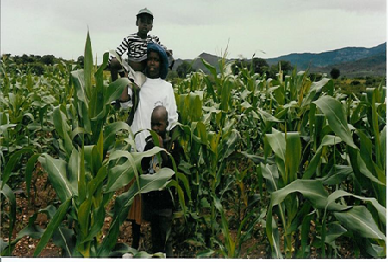During this Brown Bag, Timothy Wise, an OSF Food Security Fellow, presented his research findings on the nexus between food insecurity and international commodities markets (among other factors). Wise shared key findings from his research which highlighted that:
- Cereal production in Southern Africa has stagnated since the 1990’s and as a result SADC states are net food importers and highly dependent on food aid. Although the agricultural sector accounts for a significant proportion of employment in the region its contribution to GDP has been declining over the years. Most of the resources that are needed to improve the performance of the agricultural sector and food security in the region are already overstretched.
Climate change impacts on food security will have differentiated impacts on various sectors of society. The capacity to adapt to these impacts is shaped by a host of social and economic factors. These include social inequality but are not limited to: access to resources; poverty status; lack of representation & effectiveness in social security. People with few assets and low income earning potential such as the elderly, women and youth, poor in urban and rural areas, ethnic minorities, indigenous peoples, migrants and people who are directly dependent on natural resources for their livelihoods such as pastoralists are highly vulnerable. Those who are most affected by climate change are groups that already have to contend with multiple levels of marginalisation and social exclusion and often these groups are under-represented in policy formulation spaces at national, regional and global level. Socio-economic vulnerabilities are more pronounced in low income countries.
- Most governments in Southern Africa have developed national climate change response strategies as well as agricultural development plans. However, often these policy responses are designed without the full participation of those who will be most affected by climate change. Furthermore, they fail to address the structural underlying causes of vulnerability to food insecurity in the face of climate change. Some of the critical areas that are neglected include responses to the needs of needs of small scale farmers, women, indigenous peoples and the poor in both rural and urban areas; the extent to which macro-economic policy frameworks, trade regimes and markets undermine the resilience of the agricultural sector; as well as measures to address inequality in access to productive assets particularly land, water and other resources.
- The findings were echoed by the various stakeholders during the dialogue interaction that followed the presentation. As was evident from the contributions made by the participants, it was further noted that critical to achieving food security and much else is a successful indigenous (but not necessarily small) private sector that drives food production and all the businesses associated with it: seed companies, agro dealers, millers, transport companies, distribution channels and retailers i.e. the entire food value chain. It was further recognised that there was a need to involve the youth in the sector and strategies promoting food security.
In summary, a recurrent theme in the discussion is that Food insecurity presents threats that impede the development of “open societies” in Southern Africa. That problem of food insecurity stems from a nexus of complex factors which among others include:
- decades of lack of investment in the agricultural sector;
- unfair trade practices; poor governance;
- lack of access to productive resources such as land and water;
- deterioration of rural infrastructures;
- unsustainable land management;
- social inequalities (gender, ethnic, youth and others) and
- structural inadequacies in the agriculture and macro-economic policy frameworks among others.
- climate change impacts on food security will have differentiated impacts on various sectors of society
GWP SA’s participation in the food nexus discussion enabled GWP SA to promote the nexus thinking, and engage with other stakeholders in promoting better water governance, as part of consultation processes for the development and approval of policy instruments relating to IWRM.
